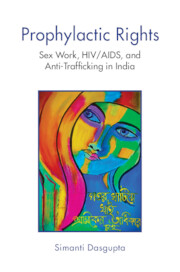Book contents
- Frontmatter
- Dedication
- Contents
- List of Figures
- Acknowledgements
- Introduction: The Karmi (Worker)—From Pesha (Prostitution) to Kaaj (Sex Work)
- 1 The Laboring Gatar: The Body between Suffering and Risk
- 2 Condom-wallis (Condom Sellers) and Condom Narratives
- 3 The Politics of Victimhood: Pachar and Trafficking
- 4 Mela, Immobility, and Imperial Feminism
- Epilogue: Another Virus, Another Lockdown
- Bibliography
- Index
3 - The Politics of Victimhood: Pachar and Trafficking
Published online by Cambridge University Press: 31 May 2024
- Frontmatter
- Dedication
- Contents
- List of Figures
- Acknowledgements
- Introduction: The Karmi (Worker)—From Pesha (Prostitution) to Kaaj (Sex Work)
- 1 The Laboring Gatar: The Body between Suffering and Risk
- 2 Condom-wallis (Condom Sellers) and Condom Narratives
- 3 The Politics of Victimhood: Pachar and Trafficking
- 4 Mela, Immobility, and Imperial Feminism
- Epilogue: Another Virus, Another Lockdown
- Bibliography
- Index
Summary
Kajol-di, then the secretary of Durbar, sent word through one of the peer educators (PEs) that she wanted to see me some time that morning. It was my last day in the field in December 2018, and I was taking turns visiting each of the three Durbar offices to say my goodbyes. I arrived at the Nilmani Mitra Street office and then proceeded to her office. We knew each other since I started my fieldwork in 2011 and she greeted me with her familiar warmth. After exchanging some itinerary logistics about when I would leave, whether I planned to return next year, how long was my flight, and so on, Kajol-di finally divulged why she wanted to see me. She had agreed to do an interview with a new initiative in Kolkata known as the Human Library, an international initiative to archive human experiences as texts. Kajol-di as the leader of Durbar was accustomed to public talks, but, she always “feels a little nervous when it comes to talking to people outside.” Her specific concern this time, and for which she was seeking my input, was how much detail she would want to share about her past, especially that she was “kind of trafficked” and also arrested thrice by the police during raids.
I was familiar with her life trajectory. That day when she began recounting her life again, I did not interrupt. These biographies, as I showed previously, are often broken and winding, and the possibility of previously untold fragments appearing is rather high. Kajol-di was abandoned by her husband when she was seven months pregnant with her daughter. “He went away with this other woman in our village,” she told me. At that time, she lived in Murshidabad, where she found a job in the region's well-known silk cottage industry. The industry was dominated by men, and soon Kajol-di found herself to be the object of gossip in her village as the only female worker. “People started questioning my character,” she recalled, and it became onerous for her to continue working there. Desperate to provide for her daughter, Kajol-di was glad when a woman in her village offered to employ her as a domestic help.
- Type
- Chapter
- Information
- Prophylactic RightsSex Work, HIV/AIDS, and Anti-Trafficking in India, pp. 147 - 201Publisher: Cambridge University PressPrint publication year: 2024

